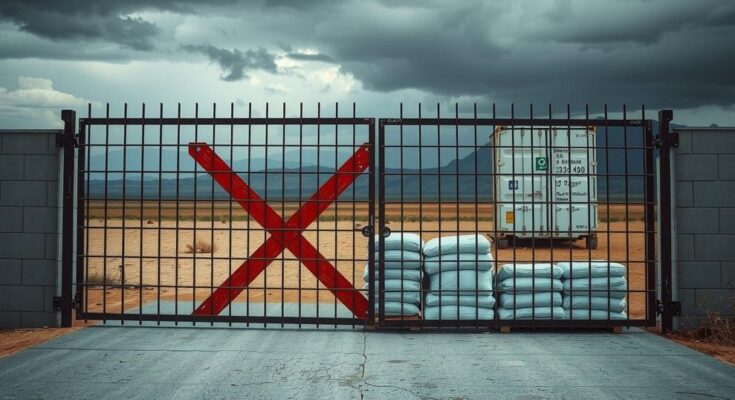Israel has blocked humanitarian aid to Gaza following the failure to initiate negotiations for the second phase of a ceasefire agreement. Prime Minister Netanyahu attributed this action to Hamas’s refusal of a truce proposal. Hamas condemned the blockade as a violation of agreements, while Egypt criticized the use of aid as a weapon against civilians. The ongoing conflict underscores the urgent need for international mediation and humanitarian assistance.
The recent ceasefire agreement in the Gaza Strip has encountered significant setbacks, culminating in Israel imposing a blockade on humanitarian aid commencing Sunday. Prime Minister Benjamin Netanyahu justified this action by stating it was a response to Hamas’s rejection of a temporary ceasefire proposal during Ramadan, put forth by US envoy Steve Witkoff. The lack of negotiations for the second phase of the ceasefire, which began on 19 January, is concerning and has generated international criticism.
In a statement following this announcement, Hamas condemned Netanyahu’s decision, labeling it as “cheap blackmail, a war crime, and a blatant violation of the agreement.” The group urged international mediators to intervene and compel Israel to cease its punitive measures impacting the over two million residents of Gaza. Egypt’s Foreign Minister Badr Abdelatty also expressed dissatisfaction, decrying the use of aid as a mechanism for collective punishment.
Netanyahu’s office confirmed that the Israeli government had accepted the U.S. proposal for a temporary ceasefire, contingent upon the release of half of the hostages, both living and deceased, on the agreement’s first day. However, amid confrontations regarding the proposals, it appears that Hamas’s refusal has led to a breakdown in communication and subsequent actions from Israel, resulting in halted aid.
Egypt announced plans for a comprehensive Gaza reconstruction initiative, to be discussed at an emergency Arab summit. Concurrently, US Middle East envoy Steve Witkoff is slated to visit Israel following President Donald Trump’s State of the Union address, which may bear implications for the ongoing discussions.
Amid the blockade, the Islamic Jihad Movement criticized Netanyahu, accusing him of undermining the ceasefire agreement and warning of the repercussions his actions will yield. The situation is further aggravated by Gaza’s economic crisis, which has increased dependency on humanitarian aid due to the complete cessation of local industries in the wake of the ongoing Israeli offensive.
In light of the escalating tensions stemming from the ceasefire stalemate, Israel’s blockade of humanitarian aid to Gaza poses significant humanitarian concerns for the civilian population. The rejection of proposed ceasefires by Hamas exacerbates the situation, placing further pressure on international actors to mediate the conflict. As discussions advance, the prospects for peace and stability remain uncertain amidst allegations of human rights violations.
Original Source: www.dailynewsegypt.com




